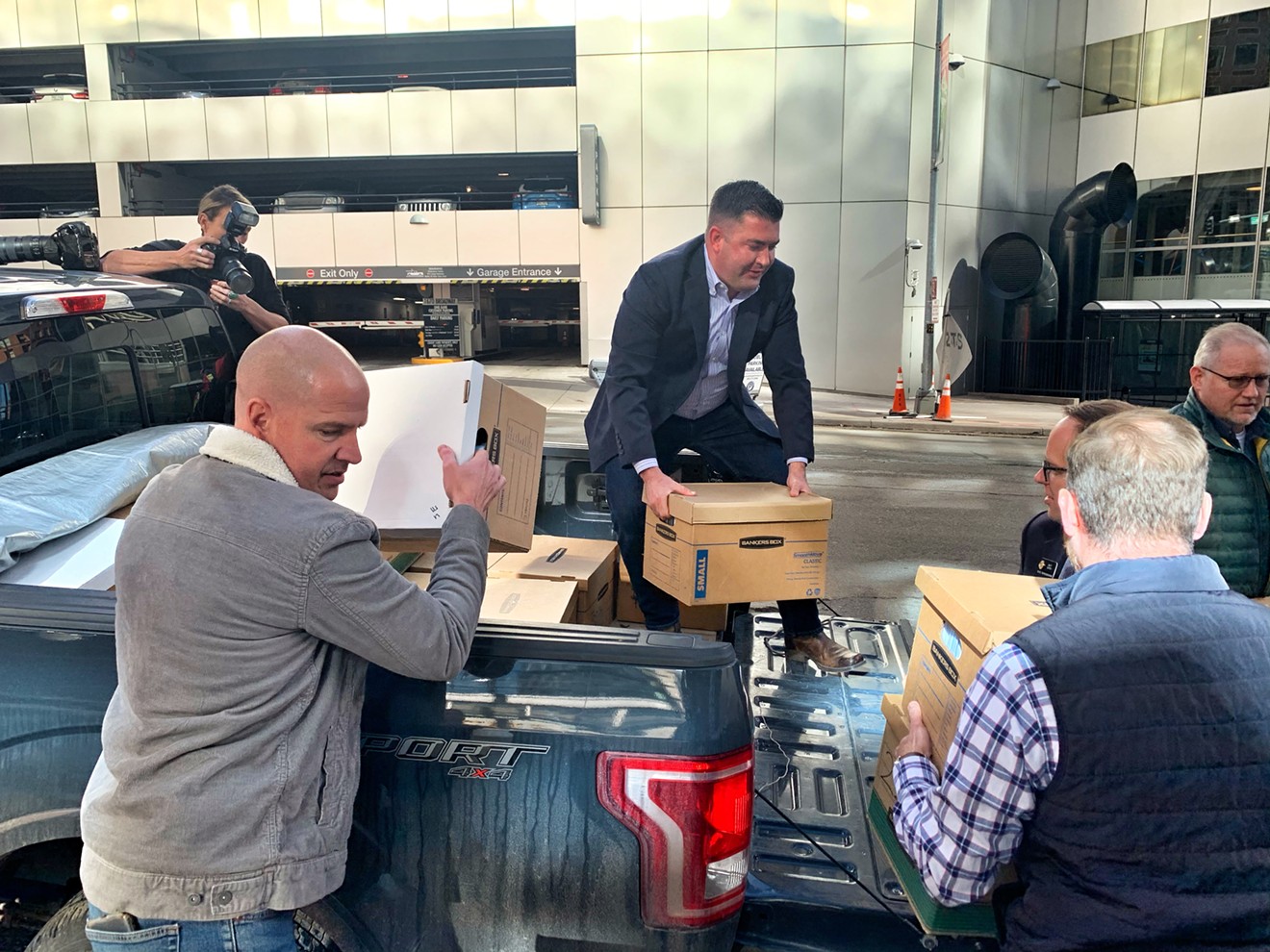On Tuesday, November 12, backers of Initiative 76, which would place a question regarding citizenship requirements for voters on the 2020 ballot in Colorado, submitted signatures to the Secretary of State's Office.
"This is a huge win for the grassroots in Colorado," said Patrick Neville, the state minority leader and one of the prominent Colorado Republicans who helped carry ballot petition boxes into the office, at a press conference.
Initiative 76 seeks to change the part of the state constitution that pertains to voter qualifications from "every citizen of the United States" to "only a citizen of the United States." Proponents say the change would remove the possibility that cities in Colorado could open up certain elections to non-citizen voters. Non-citizens are already barred from voting in state and federal elections.
Backers of the initiative say they submitted over 200,000 signatures. To make the ballot, the initiative needs 124,632 valid signatures, and 2 percent of voters in each Senate district must be represented in the count. The Secretary of State's Office will confirm in early December whether the initiative meets the standards.
Initiatives like 76 are being pushed by Citizen Voters Inc., a dark money political action committee, in states across the U.S. The group is run by John Loudon, a former Missouri state lawmaker with ties to Donald Trump.
Based in Florida, Citizen Voters has poured $1.4 million into the Colorado Citizen Voters campaign committee, Initiative 76's backer.
Asked why Coloradans should trust an initiative that has received so much money from an out-of-state entity, Neville responded, "They’re going to get a chance to vote on it. As you see, there’s 200,000 signatures. Obviously, we have over 200,000 people who signed on the dotted line who trust the initiative. I think we’re going to see even more people overwhelmingly vote for this in 2020."
Proponents say Initiative 76 will prevent what's happened in municipalities like Chicago and San Francisco, which have allowed non-citizens to vote in certain local elections. According to the Secretary of State's Office, home-rule municipalities in Colorado get to determine the qualifications of voters in their own local elections, meaning a place like Boulder could someday allow non-citizens to vote in school board or city council elections.
But even if this initiative passed with 55 percent, which is required for a constitutional change, and the constitution's citizenship requirements for voting were altered, it might not actually achieve its intended effect.
"The proponents, if they were trying to limit what happens to municipal elections in the most substantial cities in Colorado, amended the wrong provision of the constitution," Mark Grueskin, a Denver lawyer who works on Democratic causes, told Westword in October. "The Colorado constitution gives home-rule municipalities sole authority over the qualifications and the registration of their voters." According to Grueskin, cities like Boulder could still pass laws to allow non-citizens to vote in local elections even if this citizenship requirement was on the books.
George Athanasopolous, a former Republican Congressional candidate in Colorado and a backer of the initiative, discounts Grueskin's assessment.
"They bring up home rule, they bring up, 'Well, what about local jurisdictions where someone lives?' And they'll use anecdotal hypotheticals to illustrate their point. At the end of the day, the initiative is very simple. Voters can choose to agree or disagree with it. Seventy percent agree with this," Athanasopolous says in reference to internal polling on the ballot initiative.
During the press conference, Neville said he's not sure whether the home-rule section of the constitution could limit the effectiveness of this change, but argued that Initiative 76 is commonsense and hinted at a potential legal showdown. "It’ll give us that ability to fight that out in court with some strong language backing it," Neville said.
Other critics of the campaign say it's nothing more than an attempt to rally Republicans and Trump's base.
"It’s sort of a last-ditch attempt to grasp at straws around this narrative that immigrant folks are going to go ahead and try to vote in our local elections when there’s no evidence that that has happened," Nicole Melaku, executive director of the Colorado Immigrant Rights Coalition, told Westword in October.
During the press conference, Neville rejected this insinuation.
"This is something the [signature gatherers] truly believe in. They truly believe that only U.S. citizens should be voting in our elections, and that’s why they worked so tirelessly to collect over 200,000 signatures," the minority leader said.
Opponents of the initiative are calling for signatures to be invalidated after seeing petitioners in Boulder without the required badges designating them as "paid petitioners" earlier this month. Three complaints have been filed with the Secretary of State's Office, alleging that signature-gatherers were either not wearing badges denoting that they're paid petitioners or didn't have other required information listed on such badges.
Although the Secretary of State's Office says that it closely reviews all complaints it receives, the campaign might survive the complaints.
"[State] statute is fairly silent of what a remedy might be for that violation," says Ben Schler, senior legal and policy advisor at the Secretary of State's Office.
[
{
"name": "Air - MediumRectangle - Inline Content - Mobile Display Size",
"component": "12017618",
"insertPoint": "2",
"requiredCountToDisplay": "2"
},{
"name": "Editor Picks",
"component": "17242653",
"insertPoint": "4",
"requiredCountToDisplay": "1"
},{
"name": "Inline Links",
"component": "18838239",
"insertPoint": "8th",
"startingPoint": 8,
"requiredCountToDisplay": "7",
"maxInsertions": 25
},{
"name": "Air - MediumRectangle - Combo - Inline Content",
"component": "17261320",
"insertPoint": "8th",
"startingPoint": 8,
"requiredCountToDisplay": "7",
"maxInsertions": 25
},{
"name": "Inline Links",
"component": "18838239",
"insertPoint": "8th",
"startingPoint": 12,
"requiredCountToDisplay": "11",
"maxInsertions": 25
},{
"name": "Air - Leaderboard Tower - Combo - Inline Content",
"component": "17261321",
"insertPoint": "8th",
"startingPoint": 12,
"requiredCountToDisplay": "11",
"maxInsertions": 25
}
]












